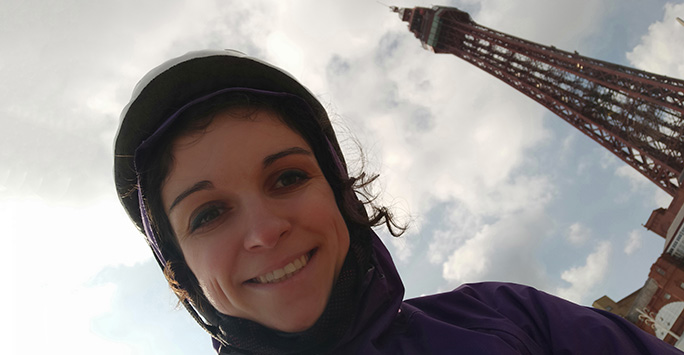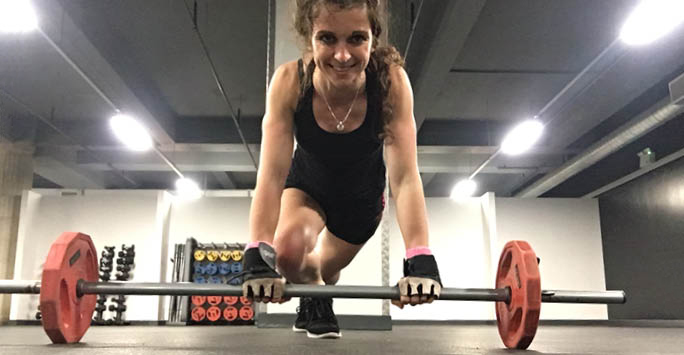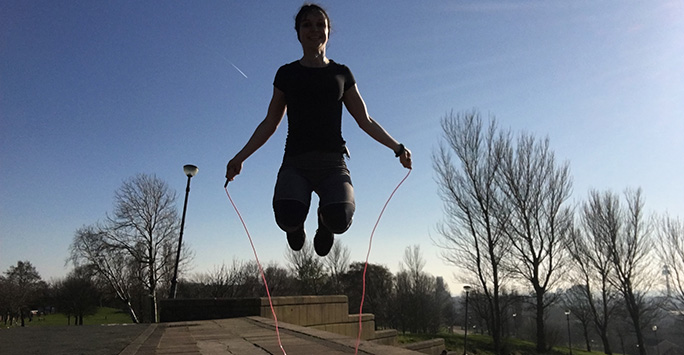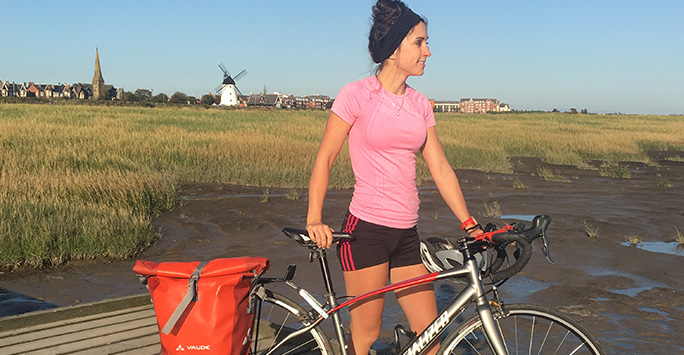
Student Spotlights pass the mic to our student doctors, to hear their take on their School experience and shine the light on a particular role, team or pathway through the School of Medicine. This month, Year 5 Student Doctor Roksana Swiderska shares her compelling story.
Roksana left Poland at the age of 19 to get some work experience in England and improve her English skills. She started off as an au pair for a family in Leicester before finding work as a bar tender, shop assistant and cleaner, while attending language school. But it was when she started volunteering at a care home that she began to consider a career in Medicine.
“I loved every second of working at the care home, doing different activities with the residents, finding creative ways to get them moving and help to improve their quality of life. Whenever someone became ill, they would call the GP and that was really my first contact with medicine. I admired them and their skills so much. Plus, I felt so fulfilled myself.
I started to think about medicine but I at the same time I thought my grades aren’t great (I was a very average student to be honest), I haven’t really done science, I have no experience. I thought I just can't do medicine, I’m too stupid.
Back home in Poland over the summer I was volunteering at a hospice, I was assisting doctors and nurses daily and I thought:
If I could make a difference to residents in the care home by simply being there and talking to them, what could I achieve by actual knowing how to help them with medical care?
Starting the application process
I remember getting in touch with a mature student who was studying medicine at Leicester and he told me about Access to Higher Education Diplomas, which are gateways for people from non-traditional backgrounds into degrees. In order to qualify for the Access to Medicine course I needed to get my GCSE in Science and so I joined a group of secondary school students to study for it.
I was rushing from the course to a bar job in the evenings and volunteering at the care home on the weekend. On my breaks at work I would be doing my homework. I was either at work, at college or studying.
The only problem was my English still wasn’t that great so I was really shy in class. When the tutor would ask me something I could see people laughing at my accent or the way I said things. But when it came to the exams I would always have the best grades because I was so motivated.
Access to Medicine
I applied and interviewed at both Liverpool and Leicester Schools of Medicine and was rejected from both. I just wasn’t prepared to handle interviews. I wasn’t confident at all and felt I didn’t have much to offer.
I attended a workshop on applying to study medicine, I was called to answer a question and everyone was impressed by my response. Something clicked in my head, ah I have lots of examples that I can use to back up my answers.
If I look at all of the different jobs I had, they all helped me. I met people from different backgrounds, in different professions. I had such a cross-section view of society. The following year, I went back and tried a new tactic – I chose not to speak to anyone before the interview. The first time round I had gotten so intimidated.

The feeling of ‘imposter syndrome’ lasted well into my time studying medicine, until I started getting good grades and met some friends and they accepted me for who I am. I felt, maybe I’m different with a different story but actually that’s all right. It’s OK to be different.
Being accepted to Liverpool
I was back home in Poland and I was really nervous. I was snapping at my mum! I was prepared for another disappointment and quite frankly there was nothing else I wanted to do. I remember going to visit my grandma where I didn’t have internet access at all. So only when I came back late at night did I open the email and I just couldn’t believe it.
I cried, my mum says I almost fainted. My mum too! We had to go outside to get some fresh air. By that time my family saw how committed I was, how much I had sacrificed, they knew how much it meant to me.
During the first couple of years I was working Friday and Saturday nights as a healthcare assistant at the Royal Hospital, mostly in A&E. I was studying hard and I was really tired. The University Student Services team were helpful in finding different types of funding and eventually we found a loan that didn’t require me to work. I couldn’t believe it when I got the call to say my application to the loan had been accepted.
Rising to the challenge
I realise now that along my journey I forgot about self-care. I put a lot of pressure on myself and felt like I should be constantly studying. In third year this all just came out. I suffered in silence up to the point where I burst out crying on placement.
On reflection, I know now how important it is to talk about it. I was on my own and I couldn’t see a way out of it.
I reached out to the School Wellbeing team and to my GP as well. Through the years I always made time for exercise. The peak point of my depression was spring/summer so I took my exercise out of the gym and to the playground, doing exercises, pull up, push ups, and I think that kept me going.
It’s difficult for me to accept help. I am usually the one offering it to others. But I am so grateful for those friends who gave me the help and support I would never have asked for.
I remember I was upset in the library and a couple of fellow students noticed. They said, Roksana we come here to study together every day after placement, why don’t you join us.
I am so grateful because that really helped to be with them and study together.
Looking to the future
To be in my final year now, feels amazing. Despite the struggle I am doing what I want to do and there hasn’t been a single day that I regretted. Even when I was tired or upset, even when I missed my family or had my heart broken, studying medicine was my foundation. To be with patients on placement, to study, the passion kept me going.
Last year I decided to come to Blackpool, and I love the fact that I can cycle and run along the sea. Which is quite a workout against the wind! I think that my background and all of the different jobs I have done has impacted my life in so many different ways.
I have learnt how to focus on the positive aspects rather than the negative, and to be happy with life’s simple pleasures.
I have been reflecting on what led to my depression and identifying areas I can work on. I am part of support groups and am doing some psychotherapy work online to equip myself with different strategies and to not burn out and even out those ups and downs.
Advice to my first year self
If I could talk to myself in first year, I would say think about the outcome, what you want to get from studying medicine and what led you to do it in the first place. That will motivate you throughout and be your engine, giving you power to study through the hard times.
Build a strong support network and mechanisms that can make you happier and improve your mood. Look out for clues in your body and moods that something is happening. I was ignoring them, but they were definitely there to pick up on.
Make time for yourself. Try not to feel guilty when you do something else rather than studying – you need to be disciplined and study on a regular basis, but you also need to take a break. Try to find active ways of learning, do questions, watch videos, discuss with a study group. If you sit and read and you feel your mind is elsewhere, that is time wasted.
The biggest thing that helped me was finding the time to work out. It gave me so much energy, physically and emotionally, and so much motivation. It helps shape your character, giving you self-discipline and consistency. All those endorphins really help too!
Do you want to step into the spotlight?
If you would like to feature in the spotlight series, or nominate someone to share their story, drop us a line at mednews@liverpool.ac.uk.
Discover more
• The School of Medicine has its own dedicated Wellbeing Team providing student doctors with tailored support. Find out more on the Wellbeing area of the student intranet.
• Book an appointment with a member of the team via the School Booking System.
• Explore the University’s Student Services available to you, including advice and guidance on Wellbeing and Money.

